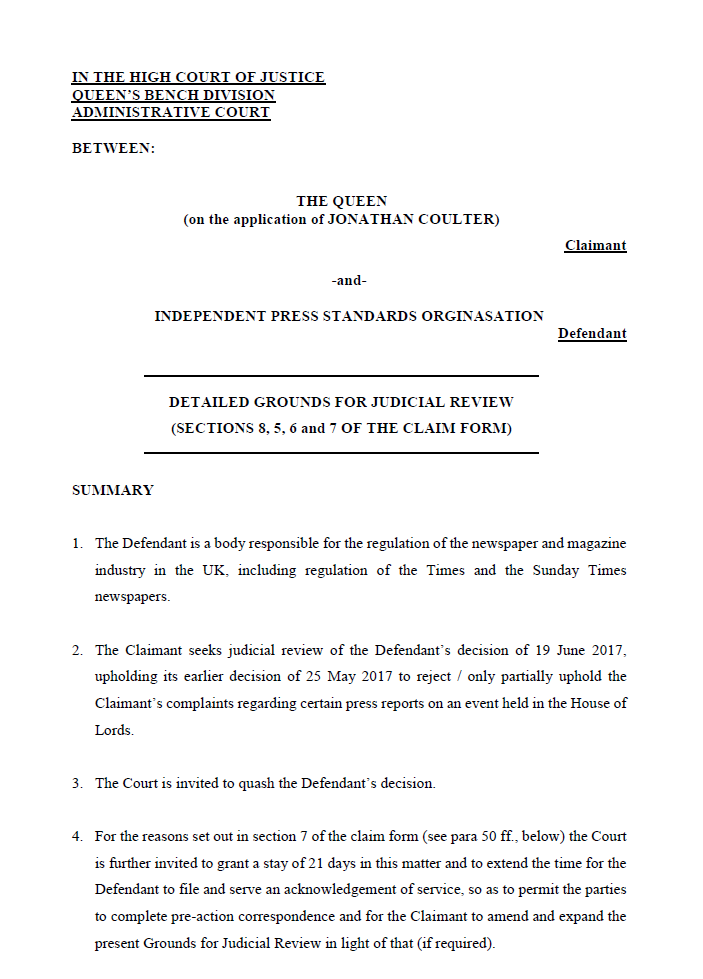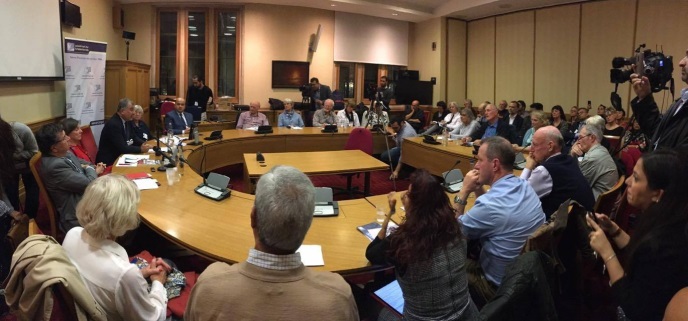
The ‘Independent’ Press Standards Organisation (IPSO) has refused to hold The Times and Sunday Times) to account. Both grossly misreported a public meeting to launch the Balfour Apology Campaign. They misrepresented the event as a sort of antisemitic ‘hate-fest’; this set the tone for other media reports. Thirty attendees complained to IPSO but IPSO failed to investigate properly.
Jonathan Coulter is seeking Judicial Review on three grounds:
- the misreporting of the conduct of Baroness Tonge
- IPSO made Insufficient inquiry
- IPSO’s decision making was irrational
The Hacked Off campaign is supporting this challenge.
Judicial review is expensive
Support Jonathan’s crowdsourcing appeal

BACKGROUND: Jonathan Coulter’s account of the meeting and a comparison with The Times and Sunday Times articles
The three articles about which we complained were:
- Jews blamed for Holocaust at ‘shameful’ House of Lords event Dominic Kennedy, Investigations Editor, The Times, October 27 2016
- Tonge’s obnoxious ideas on Jews set a terrible example, David Aaronovitch, The Times, Oct 27, 2016
- Peace be upon Israel — the Lib Dems have cut off their Tonge, by Rod Liddle, The Sunday Times, Oct 30th
Introduction and talks by invited speakers
The Palestine Return Centre (PRC) organised the meeting with the purpose of launching a British apology for the Balfour Declaration of 1917. The focus was on HMG’s failure to deliver on the commitment in the second part of the Declaration: “that nothing shall be done which may prejudice the civil and religious rights of existing non-Jewish communities in Palestine.” I cannot cover everything in a summary, but have concentrated on what was discussed around this main topic.
Baroness Jenny Tonge was in the Chair, and there were three invited speakers, including Majed Al-Zeer (of PRC), Karl Sabbagh (a publisher and expert on the Balfour Declaration), Betty Hunter (former Chair of Palestine Solidarity Campaign), and Professor Yakov Rabkin (of Montreal University, a last minute invite).
Majed Al-Zeer spoke of the suffering inflicted on Palestinians, and the responsibility of the British who needed to atone for their mistake. He advocated for Britain to apologise, to stop “its biased foreign policy” and to make sure that Palestinian rights are granted back, especially the right of return.
Karl Sabbagh said that Britain had made 12 pledges to different groups starting with the Balfour Declaration, but had kept few. Only two that were related to the Jews had any sort of relevance in the end. He then systematically analysed the case for an apology against three criteria: whether any harm was caused; whether the entity being asked to apologise (in this case HMG) was responsible for the harm, and; whether the apologiser could have avoided making the action but nevertheless chose to make it.
He concluded that Britain did indeed need to apologize on the basis of all three criteria. He spoke of “a catalogue of harm” to Palestinians, to Jews and to the Middle-Eastern region. In trying to explain the British behaviour, Sabbagh pointed to British politicians searching for “a quiet life” in the face of Zionist lobbying, quoting a specific example Prime Minister Ramsay MacDonald’s backing down on a White Paper in 1930. He also referenced a British Policy of withholding representative institutions to Palestine as long as there was an Arab majority.
He asserted that a British apology would do good. Recognition of the Palestinians’ hurt would have an important psychological effect and remove a major roadblock on the road to peace. Moreover, if Britain accepted responsibility for its share in the situation today, it “might do more about it than just parroting the long-dead two-state solution”.
Betty Hunter spoke of the colonial origins of the Balfour Declaration, whereby European Empires carved up the Middle East behind the backs of the indigenous people. This had now given way to the violence-based colonialism of the Israeli state, evident in the stealing of land and the building of settlements. She went on to blame the British and the UN, despite resolutions and platitudes, to allow all this violence to continue.
Betty went on to say that more than apology was needed, and support for the establishment of a Palestinian state with full rights for all of the Palestinian people.
Professor Yakov Rabkin discussed two contextual factors behind the Balfour Declaration, one being the Christian Zionism and the other anti-Semitism/opposition to the immigration of Russian Jews to Britain. He also contrasted the Australian apology about the treatment of aborigines (and their stopping the injustice) to the treatment of the Palestinians, where “the injustice keeps going on”.
Discussion with the floor
There were comments and questions from 13 audience members, mainly supportive of the Apology campaign.
Audience Member 5 thanked Professor Rabkin for demonstrating “the difference between a Jew and a Zionist”, and Karl Sabbagh for bringing to light new information. He believed Balfour’s motives were both racist (anti-Palestinian and anti-Semitic). Karl Sabbagh felt that it was a bit strong to ascribe Balfour’s motives to anti-Semitism and described him as a muddled thinker and not very bright.
Jaffar Ramini and Majed Al-Zeer also referred to Winston Churchill making racist comments at the expense of the Palestinians.
Audience member 5 spoke of a “Scottish dimension”, to which Karl Sabbagh said he felt that the Scottish experience of highland clearances by rich landowners (among them the Balfour family) enabled, or led Scots, towards greater sympathy for Palestine.
Audience member 8 said that Britain had taken the path of least resistance and done “the lazy thing” and, not wanting problems, had made a rod for its back. Quoting from the Balfour Project Companion Guide, he said that in 1917 the British establishment had been fooled into believing that World Jewry had power that it simply lacked (re the outcome of WW1). However 100 years later, the Zionist movement (a segment of Jewish opinion) enjoyed real power over the British Parliament placing people in an invidious situation. They feared that if they spoke up for Palestinians, they would be outed or denigrated or, in the words of Sir Alan Duncan, of being “trashed, traduced and bullied”. This was in turn adversely impacting on free speech in the UK.
Audience member 9, a Palestinian, complained that the Balfour Project had invited two Jewish people to speak at a forthcoming event, but no Palestinians. Bs Tonge indicated there was probably a reasonable explanation but she would look into the matter.
Audience member 11, an orthodox rabbi from an anti-Zionist sect, was barely comprehensible, but the transcript shows he claimed that Zionism “doesn’t come from Judaism (inaudible) – so this Islamic state in Syria is nothing to do with Islam. It is a perversion of Islam, just as Zionism is a perversion of Judaism which serves certain non-Semitic interests”.
He went on to say that the American Rabbi Stephen Wise had (in 1935) made the boycott on Germany, “which antagonised Hitler over the edge to then want to systematically kill Jews wherever he could find them”.
Bs Tonge thanked the Rabbi for his intervention and went on to advocate for the Boycott, Divestment and Sanctions Campaign (BDS), to persuade the Israeli Government to stop what they are doing (this was then applauded).
Contrasting The Times and Sunday Times articles and the above account
There was a lot of interesting information at this meeting, particularly Karl Sebbagh’s insights, but none of this is evident in the three above-mentioned articles. At no time did they mention any of the invited speakers, but the Times quoted in disapproval the Israeli Embassy (which was not represented) no less than three times, and it also quoted a pro-Israeli blogger who did not speak at the meeting.
The articles also drew very heavily on the practically inaudible statement of Audience member 11, an individual with no apparent relationship with the other participants, and drew this to make the meeting look like an anti-Semitic event. The Times entitled its article: “Jews blamed for Holocaust at ‘shameful’ House of Lords event”, making it look as if audience member 11 had blamed ‘Jews’ collectively for setting Hitler on the road to the Holocaust, whereas he had in reality blamed a single individual (Rabbi Stephen Wise).
All three articles cherry-picked audience-member statements and presented them out of context to make it look as the meeting was a riot of anti-Semitism. Liddle’s Sunday Times article went further and invented statements and actions, for example claiming that someone said that “Israel should be wiped from the map”, and saying that Bs. Tonge was nominated for a peerage “on account of her services to Jew-hating”. Aaoronvitch’s and Liddle’s pieces were full of distasteful and very unpleasant invective about Bs. Tonge’s previous behaviour, with statements that could be seriously challenged. However, this goes beyond the coverage of the Oct 25th meeting which was the subject of our complaint to IPSO.
By blaming Bs Tonge for not challenging ‘provocative statements’, the newspapers were expecting her to go beyond the call of duty, as if it were here job to censor audience members who happen to attend. Moreover, Audience member 11 was practically incomprehensible.



